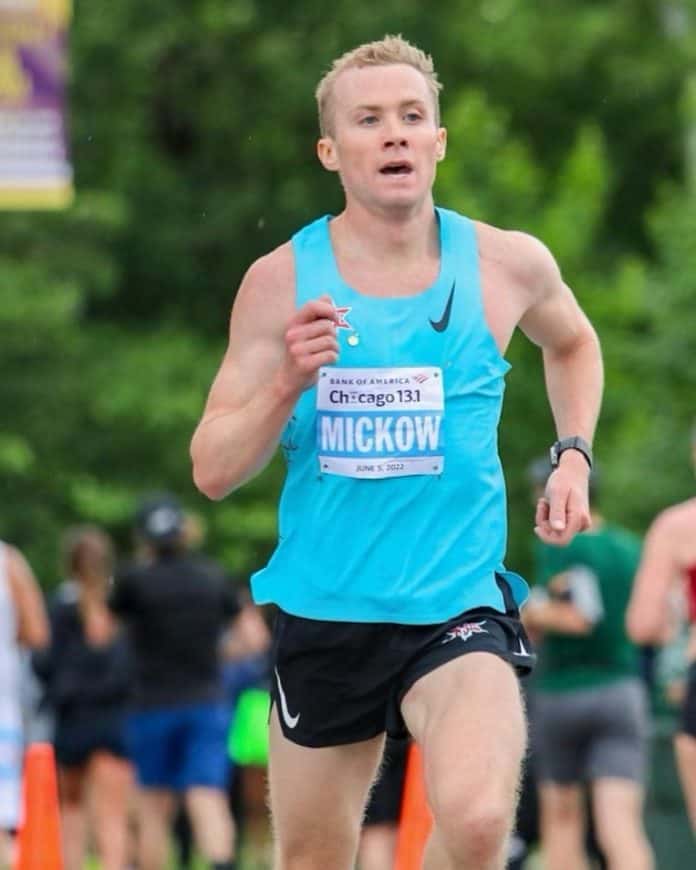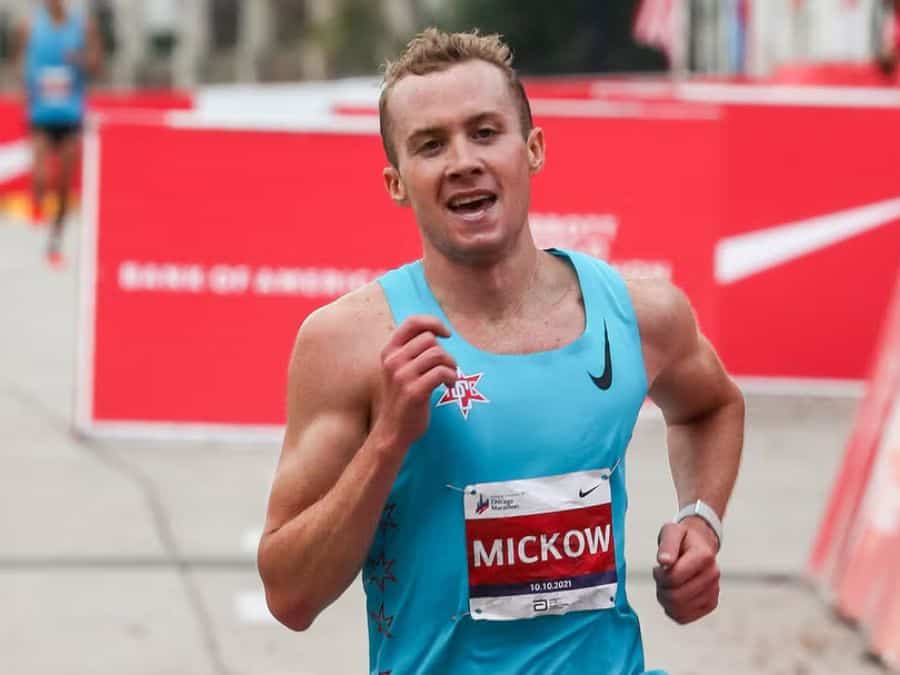In our RT Snap Q&A series, we’ve had the privilege of interviewing some of the world’s best runners, delving into their extraordinary journeys, celebrating their achievements, and exploring the unwavering dedication that defines their careers.
Colin Mickow
- Born on March 15, 1990
- Nationality: American
- 3rd in Bloomington Big 10,000m, May 2010 with a time of 29:10.74
- 20th in the Aramco Houston Half Marathon, January 2020 with a time of 1:01:47
- 15th in USA Olympic Team Trials Marathon, February 2020 with a time of 2:13:45
- 12th in the Marathon Project, December 2020 with a time of 2:11:22
- 6th in the Bank of America Chicago Marathon, October 2021 with a time of 2:13:31
- 13th in the Aramco Houston Half Marathon, January 2022 with a time of 1:01:41
- 9th in The Cowtown Half Marathon, February 2023 with a time of 1:03:23
- 20th in U.S. Olympic Team Trials – Marathon, February 2024 with a time of 2:14:59

RT: Colin, you started running competitively in high school. Can you tell us about your first major race and how it shaped your future in long-distance running?
Colin: My first year of track was in Jr High, 7th grade. I qualified for the Illinois state meet in 3 events and medaled in the 1600m that year. After that, I knew it was the sport for me.
RT: You’ve had some impressive finishes, including top placements in major marathons. Can you share the story behind one of your most memorable races and what it took to achieve that result?
Colin: My most memorable race might be my 6th place finish in the Chicago Marathon in 2021. I had a rather short training block of only 10 weeks.
Because of the short block, I was fairly aggressive in my training hitting over 150-mile weeks multiple times. I was doing 3 hard longer days in a row (26-20-18) with one workout in the middle of the week.
View this post on Instagram
The day of the race was hot and humid, so I believe grinding through many workouts in the humid Illinois summer helped my performance. I led the chase pack for almost the entire back half of the race until I was the only one left.
RT: What does a typical training week look like for you leading up to a major marathon, such as the Chicago or Boston Marathon? How do you structure your long runs, speed work, and recovery days?
Colin: During a marathon training block a typical week would contain 1 “speed work” day and 2 runs at 20+ miles for long runs.
The “speed work” is often a 12-mile tempo around marathon pace or something like mile repeats sub marathon pace, which would be in the middle of the week. The Long runs are usually back-to-back on the weekend, 26 miles Saturday and about 20 miles Sunday. Both long runs will often have a progression down to around marathon pace.
The rest of the week is easy, recovery/milage days. The typical easy day for me is 12 miles before work and 6 miles after work.
RT: Every athlete faces setbacks. Can you share a specific instance where you encountered a major obstacle in your career, such as an injury or a disappointing race, and how you overcame it?
Colin: I went into the 2022 World Championships in the best shape of my life. However, I got tripped up at a bottle station around 10K and fell very hard. I ripped up my arm, tore my meniscus, strained my hamstring, and had extreme cramping the entire race after the fall. I had to stop and stretch just to keep from straining my other hamstring. Post race, I spent at least 2 hours in the med tent trying to slow the total body cramping that I was enduring until they finally gave me an IV.
It was obviously a very disappointing outcome, and especially so once I found out that I would need to get surgery to repair the torn meniscus, so I’d also have to sit out of the Fall marathons that year.
I overcame it by knowing that I would eventually heal and come back stronger than before.
RT: Your twin brother, Hunter, is also a competitive runner. How has having a training partner and sibling in the same sport influenced your training and performance? Any memorable moments from races you’ve both competed in?
Colin: You’ve done your research here. My bro has not been a competitive runner since his college days over a decade ago. He is now a body builder with probably about 50lbs of more muscle on his frame than me.
Back when he did run, it was great to have him to train and race with. Having someone so close be your biggest competition can be fun but also tough. We would push each other to be better in training and racing, but we also drove each other mad at times. He is an extremely disciplined person, which I believe helps me be more disciplined in my life.
We worked together more in high school races, because we were often asked to race 4 events each to get points for the team. We knew that it was in our best interests to help each other conserve energy rather than trying to beat each other all the time. I had an undefeated season my senior year, so in the races where we were “holding back” to conserve, he always let me win (I think I would have anyway, but he probably disagrees). By the time we were in college (we both ran at the University of Illinois), we worked together at the beginning of the race (as good teammates do), but by the end of a race all bets were off. He probably beat me more times than I’d like to admit, but I would say that I came out ahead if you tally up the number of wins in our “faceoffs”. We still often argue about who was better in college though.
View this post on Instagram
RT: Nutrition and recovery are crucial for any athlete. Can you share some insights into your diet and recovery routines? How do you ensure your body is in peak condition for race day?
Colin: I am fairly casual with my diet. I add a scoop of whey protein to my coffees every morning. I take a vita D and an iron supplement. I always have a protein shake after a hard effort, and I stay on top of hydration. I usually only consume anything during a run when it is hot out.
To be in peak condition on race day, I obviously taper, and I will carb load a couple days out with pasta. I also usually like to do an ice bath 3 and 2 nights out from the race.
RT: Looking ahead, what are your next big goals in running? Are there specific races you’re aiming to win or personal bests you’re striving to achieve?
Colin: My next big race will be in Chicago this Fall. My goal will be to be better than I’ve been before.
